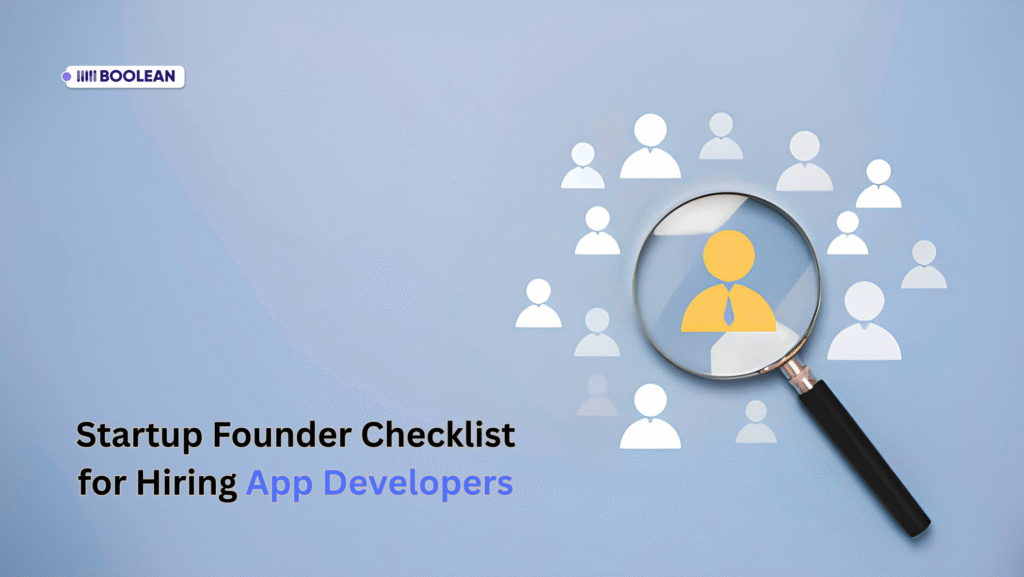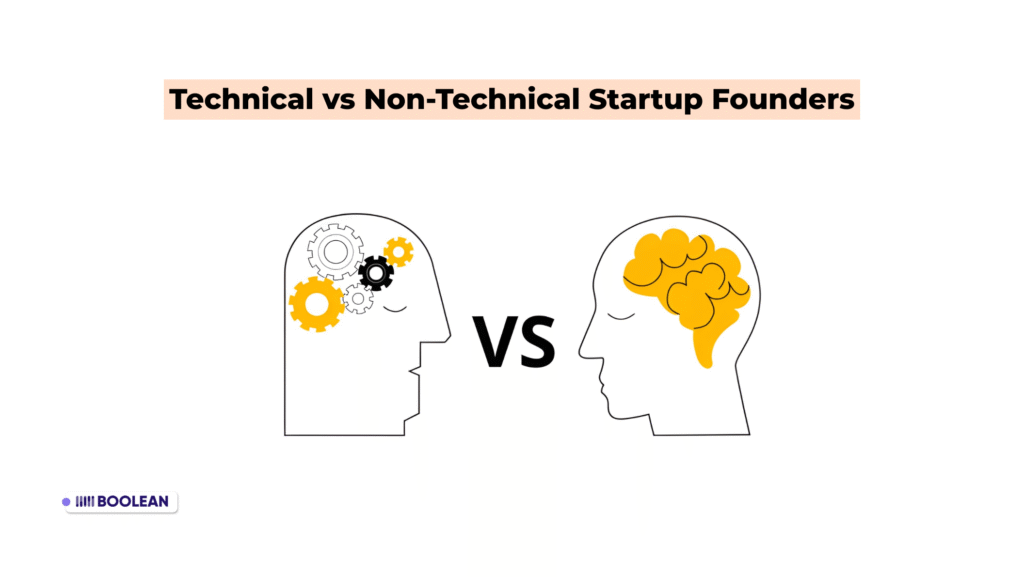Introduction
You’ve got a billion dollar app idea, maybe it’s the next marketplace, a health-tech tool, or a community app that could actually help people.
Exciting, isn’t it? Then reality comes and says that you need someone to build it.
And if you are new to the tech world, hiring app developers might be the way to enter a foreign country without a map or a translator.
The sad fact is that 74% of startup companies have wrongly hired a developer at least once.
The mistake only?
The company loses on average $240,000 due to the time that could have been used for something productive, resources that go to waste, and opportunities that are not grasped.
No need to stress, this is the situation that every first-time founder has been through.
You are attempting to understand which person to bring on board, what qualifications to look for, and how much the salary should be. This is quite overwhelming.
If you are building startup team for mobile app development for the first time or you are expanding a team that you already have, you cannot afford to make such a mistake.

However, the good news is that with the proper startup founder checklist, you can make your decisions confidently instead of guessing.
Figuring out your mobile app project is an activity that precedes the actual job posting. Essentially, it is all about knowing your requirements, available money, and time span.
The developers that you need for your app release and upkeep should be those who consider the product’s life beyond the next short-term sprint.
After reading this manual, you will have an exact idea of which app developer will fit your personal case the best.
You will get the idea of the relative positions of in-house and agency decision making when it comes to recruitment. Most importantly? You’ll build a startup development team capable of turning your vision into reality.
Ready to build something extraordinary? Let’s dive into your pre-hiring preparation, because knowing what you need beats guessing every single time.
Know What You’re Building Before You Hire Developers

If you are considering filing resumes or posting job listings to get the right people, you must first think about what qualities a new hire should have.
This step is much like creating a blueprint for your house; even a genius developer won’t be able to figure out what you’re trying to build without it.
1. Defining Your App Development Needs and Project Scope
Begin by clarifying what you really need to do.
Are you creating a simple MVP to demonstrate your concept, or do you need a fully-featured app that is ready for the market?
Identify your core features, nice-to-have features, and possible expansion plans for the future. It is not only about giving the developers the idea of your project, it is also about helping you figure out which developer is suitable for you.
Think of your timeline as a mirror of reality.
If you wanted to be on the market within three months, then the kind of person you need with the skills and availability would be totally different compared to a year-long development project.
Do not hide from yourself your limitations, like budget, technology complexity, and market pressures.
2. Mobile App Project Planning Essentials
Your project planning should cover the following questions and more:
- Who will be your target audience?
- Which platforms will you have to support initially, iOS, Android, or both?
- What is your marketing strategy, and how does your app fit into it?
Design your customer journey from installation to the main value offered.
This task will help you set apart the features that are really necessary for your MVP and the ones that can be saved for the second version.
The point is not to manufacture everything from the get-go but to come up with a product that can prove your concept is right and bring you closer to product-market fit.
3. Choosing Your Mobile Technology Stack
The choice of your technology stack would determine the people you hire and the money you will spend.
Native development (two different apps for iOS and Android) is usually the one that brings the best performance and the best user experience, although it requires more experienced developers and more money.
In the meantime, solutions like React Native or Flutter can be more affordable and quicker to market, but they may also be limited in some aspects.
Please, do not make this choice on your own without any help.
See what technologies your potential competitors are using, think about how you can scale your product in the long run, and consider the talent pool that is either in your area or in your budget range.
In case you are not technically skilled, receiving advice from a reliable technical advisor can be of great help in this situation.
4. MVP Development Strategy Considerations
MVP strategies should emphasize the importance of a core hypothesis that is proven through the least number of features.
Simply put, these are the one or two features that bring the main value of your app and you will develop them thoroughly, rather than making ten features but at a low quality.
Think about the things that you can confirm without building anything.
A landing page, prototyping, or even a manual process might help you test your assumptions, thus saving you the hassle and expense of unconventional development.
Your MVP should be created for learning purposes only, but still good enough so that it would attract the attention and interest of the users.
It may seem as if this preparatory work is never-ending and boring, but in fact, this is what differentiates the successful startup hires from the costly mistakes.
When you are clear on these basics, you will have the ability to interact with potential developers efficiently, and at the same time, you will be able to make better decisions throughout the hiring process.
Technical vs Non-Technical Startup Founders: Different Approaches

Since you were a founder, your personality will largely influence the way you hire app developers.
On the one hand, after reading the technical job description, the founder will be able to do the first cut of the applications and put their archaic and superfluous knowledge away for a second.
Although the technical specialist will be able to understand the candidate’s level right from the start, the non-technical founder will scan the paper and decide if it should go further or into the trash.
Non-technical founders can, in fact, be more efficient in the initial selection.
In addition, non-technical founders, who are the CEOs by default, are sensible to put more focus on other factors than technology.
Hence, they can set the right priorities and, if necessary, add people who will manage the specialist employees better.
Long story short, without the assistance of a technical person, the non-technical tech founder will be able to see if a short description passes or fails, while the technical specialist will see the levels of the candidate within the branch to which he is dedicating.
Decision-making for Technical Doubts
As a technical founder, you are in a position to weigh the pros and cons of the code to determine its quality, the validity of an architectural decision, or to judge the technical problem-solving aptitude of your interviewee.
Instead of looking for developers who will be like you, find those whose capabilities will supplement your skills.
In case you are competent at the backend, the best choice will be a frontend developer or if you want your app to work on devices, someone with mobile-specific knowledge.
Hire someone who will be able to question your technical decisions in a positive manner. You want a technical member of the group who will challenge you and open your eyes rather than simply strengthen your view by agreeing.
Don’t allow yourself to be in a situation where perfection is the enemy of success.
What you need in your startup is a piece of software that can be used by customers, not a technical masterpiece that is never released.
Assess developers based on their skills in doable technical tasks and being business-minded at the same time.
Non-Technical Founder Guidance for Evaluating Tech Talent
As the non-technical founder, you must deal with the challenge of the fact that you can hardly evaluate the technical skills of the people you hire.
The fantastic part is that, on the other hand, the qualities above (communication, problem-solving, and business understanding) are exactly what you can completely assess in a startup developer, and they matter even more than the rest.
Here’s a practical framework for non-technical founders:
| Evaluation Area | What to Look For | Red Flags |
|---|---|---|
| Communication | Can explain technical concepts in simple terms, ask clarifying questions about business goals | Uses excessive jargon, dismissive of business constraints, poor listening skills |
| Problem-Solving | Breaks down complex problems, considers multiple solutions, thinks about edge cases | Jumps to solutions without understanding the problem, rigid thinking, band lames tools/frameworks |
| Business Awareness | Understands startup constraints, suggests cost-effective solutions, considers user experience | Focuses only on technical elegance, ignores budget/timeline, dismisses business input |
| Portfolio Quality | Shows progression of skills, explains decision-making process, demonstrates finished projects | Only shows code snippets, can’t explain choices, no completed projects |
Understanding App Development Skills and Requirements
Whether you’re technical or not, you need to understand the core skills and mobile specific development skills required for your specific project.
Here’s a breakdown of essential competencies:
| Skill Category | Key Competencies | Why It Matters for Startups |
|---|---|---|
| Core Development | Programming languages (Swift/Kotlin for native, JavaScript for cross-platform), database design, API integration skills | Foundation for building functional apps |
| Mobile-Specific | Platform guidelines (iOS/Android), app store optimization, mobile UI/UX patterns | Ensures your app feels native and gets approved |
| Startup-Relevant | MVP thinking, agile development, version control (Git), testing practices | Helps you move fast and iterate effectively |
| Soft Skills | Communication, time management, adaptability, learning agility | Critical for startup environment and remote work |
Assessing Technical Competency Without Deep Technical Knowledge
If you are a non-technical person, you may want to try these approaches:
First, ask candidates to present one of their projects from the portfolio.
Observe how they clarify their choices, answer your questions, and relate technical decisions to business results.
A developer in good standing should be able to explain why they selected certain technologies or approaches and do it in such a way that you understand.
Next, get the permission to talk to the references of the developer and employers, whom you can also ask about the developer’s ability to work under pressure, communicate progress, and deliver on time.
Technical skills can be acquired, but the developer’s work ethic and communication patterns are more difficult to change.
What about a technical advisor to be involved in the recruitment of key positions? It can be a consultant, a mentor, or even an entrepreneur with technical experience.
It can be really helpful to have someone do the technical interview when you concentrate on the cultural fit and business alignment.
Both types of founders, technical and non-technical, should be aware of the fact that you are not only hiring a coder but someone who will eventually influence the development of your product and maybe the future of your company.
Technical skills are necessary, but they are just one side of the coin.
Hiring Options: Finding the Right Fit
Choosing between freelancers, in-house developers, or an app development agency is one of your first major decisions. Each option comes with distinct advantages and trade-offs that can significantly impact your startup’s trajectory.
Freelance vs In House Developers Comparison
| Factor | Freelancers | In-House Developers |
|---|---|---|
| Cost | Lower hourly rates, no benefits | Higher total cost, benefits included |
| Speed to Start | Can begin immediately | Longer hiring process |
| Commitment | Project-based, may juggle clients | Dedicated to your success |
| Scalability | Easy to scale up/down | Harder to adjust team size |
| Knowledge Retention | May leave with project knowledge | Builds institutional knowledge |
| Best For | MVPs, specific features, short-term projects | Long-term development, core team building |
Outsourcing App Development Pros and Cons
For a startup without a tech-savvy leader, simply outsourcing development to agencies might seem like a quick-fix solution. However, it’s still a decision that necessitates a thorough weighing of pros and cons.
Essentially the benefits come down to having access to a complete team of multi-skilled people, mature working methods, and shorter time-to-market.
On the other hand, the situation might be such that you experience communication difficulties, have limited influence over the progress of development, and run the risk of trouble relating to the code quality or even the rights to it.
Hiring Remote App Developers: Considerations
Working with remote employees allows you to access talents from around the world which means your expenses can be drastically lowered.
However, to be able to make it work, it is necessary to have efficient communication systems and be good at project management.
Ensure that employees are accustomed to remote working, establish clear communication methods, and consider time zone overlaps for working together.
A developer who works remotely can do as well as a local developer if he is managed in the right way. Besides, he can bring the diversity of his perspective, which will have a positive impact on the development of your product.
The best decision is the one that fits your condition: the amount of money you have, the period of time, your level of technical knowledge, and the long-term plan of your development team.
Evaluating Candidates: Skills and Portfolio Assessment
The real work starts after you have figured out the potential candidates: you need to find out which developers are truly qualified and which ones just have a good paper impression.
This assessment step is the one that can decisively influence your choice.
Essential Skills Required for App Developers
| Technical Skills | Experience Level | Why Critical for Startups |
|---|---|---|
| Platform Languages | 2+ years (Swift/Kotlin or React Native/Flutter) | Core functionality development |
| Database Management | Intermediate (SQL, NoSQL) | Data storage and retrieval |
| API Integration | Advanced | Connecting to third-party services |
| Version Control | Proficient (Git) | Code management and collaboration |
| Testing | Intermediate | Ensuring app stability and quality |
App Developer Portfolio Review Checklist
| Portfolio Element | What to Evaluate | Red Flags |
|---|---|---|
| Project Variety | Different app types, complexity levels | Only simple apps or tutorials |
| Code Quality | Clean, documented, well-structured | Messy code, no comments, poor organization |
| App Store Presence | Published apps with good ratings | No published apps, poor reviews |
| Problem-Solving | Can explain technical challenges overcome | Vague descriptions, no specific examples |
| Recent Work | Projects within last 1-2 years | Outdated technology, old frameworks |
Evaluating Coding Skills Effectively
When carrying out a technical evaluation, it is advisable to concentrate more on the practical assessment than on theoretical knowledge.
You can request the candidates to demonstrate their code, clarify the architectural changes, or solve a minor problem that is relevant to your project.
Instead of complex algorithms that they might not use at all, try to find coding that is clean, readable and logical problem-solving approaches.
Technical Interview Questions for Developers
Make interviews real and useful:
- “Explain to me how you would have built [specific feature from your app]”
- “What would you do if [common scenario like offline functionality or data synchronization]?”
- “Tell me about a technically difficult problem that you solved and the way you solved it”
- “What steps do you take to ensure app performance and user experience?”
Concentrate on their reasoning, language, and the capability to divide a difficult problem into smaller parts.
Beyond Technical Skills: Soft Skills Matter
Technology knowledge is not enough to ensure the success of a startup. Developers who succeed in startup settings are usually endowed with important soft skills that can be the deciding factor whether the app development process will be easy or will be full of conflicts.
Developer Communication Skills Importance
| Communication Aspect | Why It Matters | How to Assess |
|---|---|---|
| Progress Updates | Keeps you informed, prevents surprises | Ask about their reporting style and frequency |
| Problem Explanation | Helps you make informed decisions | Have them explain a technical challenge in simple terms |
| Requirement Clarification | Reduces misunderstandings and rework | See how they ask questions about unclear requirements |
| Feedback Reception | Essential for iterative development | Discuss how they handle criticism and change requests |
App UI/UX Design Understanding
Although a designer might be dedicated to you, developers that know user experience principles lead to better products.
Find candidates who are able to talk about user flows, accessibility considerations, and mobile design patterns. Also, they must have the capability to recognize possible usability problems and to propose solutions without the need of simply carrying out the designs.
Agile Development Experience for Startups
| Agile Practice | Startup Benefit | What to Look For |
|---|---|---|
| Sprint Planning | Predictable delivery cycles | Experience with breaking work into manageable chunks |
| Daily Standups | Quick issue identification | Comfort with regular communication and transparency |
| Retrospectives | Continuous improvement | Ability to reflect on process and suggest improvements |
| Adaptability | Handles changing requirements | Examples of pivoting or adjusting to new priorities |
Cultural Fit Assessment
Developers in startup environments should be able to handle the situation when things are not clear, be ready to do different kinds of work, and be enthusiastic about creating something new.
Find employees who question your vision, seem genuinely interested in your field of work, and were adaptable in their previous roles.
Top startup developers have the technical skills necessary but also possess good communication skills, empathy for users, and the capability of effectively working in rapidly changing situations with limited resources.
Legal and Financial Considerations
Sorting out the law and money parts properly at the very beginning will not only secure your startup, but it will also lay down the rules of the game.
Your money, time, and the bond you will keep with your developers later on will be influenced by these choices.
Software Development Contract Essentials
| Contract Element | What to Include | Why It Matters |
|---|---|---|
| Scope of Work | Detailed feature list, deliverables, acceptance criteria | Prevents scope creep and disputes |
| Timeline & Milestones | Specific deadlines, payment triggers, review periods | Ensures progress tracking and cash flow management |
| Intellectual Property | Code ownership, licensing rights, third-party components | Protects your startup’s core assets |
| Confidentiality | NDA terms, data protection, non-compete clauses | Safeguards business secrets and user data |
| Payment Terms | Rate structure, payment schedule, late fees | Manages cash flow and expectations |
| Termination Clause | Notice period, deliverable handover, final payments | Provides exit strategy if relationship doesn’t work |
App Development Cost Factors
| Cost Driver | Budget Impact | Cost Range | Ways to Optimize |
|---|---|---|---|
| Platform Choice | High | Native: 40-60% more than cross-platform | Start with one platform or use cross-platform framework |
| Feature Complexity | Very High | Simple: $10K-50K, Complex: $100K+ | Focus on MVP, phase development |
| Developer Location | High | US: $100-200/hr, Eastern Europe: $40-80/hr | Consider remote talent, offshore options |
| Team Size | Medium | 1 developer vs 3-5 person team | Start small, scale based on timeline needs |
| Third-party Integrations | Medium | $2K-15K per integration | Use existing APIs, avoid custom integrations |
| Design Complexity | Medium | Custom UI: 20-30% of total cost | Use platform standards, simple designs |
App Development Timeline Planning
| Development Phase | Typical Duration | Key Deliverables | Payment Milestone |
|---|---|---|---|
| Planning & Design | 2-4 weeks | Wireframes, mockups, technical specs | 20-25% |
| MVP Development | 8-16 weeks | Core features, basic functionality | 50-60% |
| Testing & Refinement | 2-4 weeks | Bug fixes, performance optimization | 15-20% |
| App Store Submission | 1-2 weeks | Store-ready build, metadata, approval | 10-15% |
Payment Structure Options
| Payment Model | Pros | Cons | Best For |
|---|---|---|---|
| Fixed Price | Predictable budget, clear scope | Less flexibility, potential for disputes | Well-defined projects, tight budgets |
| Hourly Rate | Flexibility, pay for actual work | Unpredictable costs, requires monitoring | Evolving requirements, ongoing development |
| Milestone-Based | Balanced risk, progress tracking | Requires clear milestones | Most startup projects |
| Equity + Reduced Rate | Lower upfront costs, aligned interests | Dilution, complex agreements | Cash-strapped startups with high potential |
Risk Mitigation Strategies
| Risk | Mitigation Strategy | Contract Protection |
|---|---|---|
| Developer Disappears | Require regular updates, code repository access | Termination clause, deliverable handover requirements |
| Quality Issues | Define acceptance criteria, testing requirements | Revision rounds, quality standards |
| Scope Creep | Detailed specifications, change request process | Additional work approval process |
| Delayed Delivery | Realistic timelines, milestone tracking | Late delivery penalties, timeline adjustments |
Launch and Beyond: Ensuring Long-Term Success and Sustainable App Maintenance
The development phase is just the beginning. How you handle testing, launch, and ongoing maintenance determines whether your app succeeds in the market and continues to serve users effectively.
App Testing and QA Checklist
| Testing Type | What to Test | Timeline | Responsibility |
|---|---|---|---|
| Functional Testing | Core features, user flows, edge cases | 1-2 weeks before launch | Developer + QA |
| Performance Testing | Load times, memory usage, battery drain | 1 week before launch | Developer |
| Device Testing | Multiple devices, OS versions, screen sizes | Ongoing during development | Developer + Beta users |
| Security Testing | Data encryption, API security, user privacy | 2 weeks before launch | Security specialist |
| User Acceptance Testing | Real user scenarios, usability issues | 1-2 weeks before launch | Beta users + Stakeholders |
App Launch and Maintenance Planning
| Launch Phase | Key Activities | Success Metrics | Maintenance Needs |
|---|---|---|---|
| Pre-Launch | Beta testing, app store optimization, marketing prep | Beta user feedback, crash rates | Bug fixes, performance optimization |
| Launch Week | Monitor performance, user feedback, crash reports | Download rates, user retention, app store ratings | Hotfixes, customer support |
| Post-Launch | Feature updates, user engagement, scaling | Monthly active users, revenue metrics | Regular updates, new features |
| Long-term | Platform updates, security patches, feature evolution | User lifetime value, market share | Ongoing development, technical debt management |
Product-Market Fit Considerations
| Indicator | Measurement | Action Required | Developer Involvement |
|---|---|---|---|
| User Retention | 30-day retention >40% | Feature improvements, onboarding optimization | Medium – feature development |
| User Feedback | App store ratings >4.0 | Bug fixes, UX improvements | High-technical fixes |
| Usage Patterns | Daily active users growth | Feature prioritization, analytics implementation | Medium – tracking setup |
| Market Response | Organic growth, word-of-mouth | Product pivots, feature additions | High-potential rebuilds |
Ongoing Development App Cost and Support Structure
| Maintenance Type | Frequency | Estimated Cost | Planning Considerations |
|---|---|---|---|
| Bug Fixes | As needed | 10-20% of development cost annually | Maintain developer relationship or support contract |
| OS Updates | 2-3 times per year | 5-15% of original cost per update | Plan for iOS/Android version compatibility |
| Feature Updates | Monthly/Quarterly | 20-50% of original cost annually | Prioritize based on user feedback and business goals |
| Security Patches | As needed | 5-10% of development cost annually | Critical for user trust and compliance |
Building Long-term Developer Relationships
| Relationship Model | Pros | Cons | Best For |
|---|---|---|---|
| Retained Developer | Continuity, deep product knowledge | Ongoing costs, dependency | Apps requiring frequent updates |
| Support Contract | Predictable costs, guaranteed availability | Limited scope, potential delays | Stable apps with occasional needs |
| Project-Based | Cost control, fresh perspectives | Knowledge transfer issues, inconsistency | Well-documented apps, infrequent changes |
| In-House Transition | Full control, dedicated focus | Higher costs, hiring challenges | Scaling startups with steady revenue |
How Boolean Inc. Can Simplify Your Developer Hiring Journey
It is possible to locate the appropriate app developer for your startup without having a tough time with a process that is full of doubt and risk.
Boolean Inc. is well aware of the challenging nature of the founding teams of startups as they put together their technical teams, and we are the ones to close that difference.
With Boolean Inc., a small team has changed to a leading software and technology company, with the talent of a diverse group of engineers, designers, data scientists, mathematicians, and creative innovators since 2018.
Our involvement with startups has equipped us to have great insights into what factors lead to the success of development partnerships and what factors lead to their failure.
Why Startups Choose Boolean Inc.
| Challenge | How We Help | Your Benefit |
|---|---|---|
| Technical Evaluation | Pre-vetted team with proven track records | Skip the guesswork in assessing skills |
| Project Scoping | Collaborative planning and MVP strategy | Clear roadmap and realistic timelines |
| Cost Predictability | Transparent pricing and milestone-based payments | Better budget control and cash flow management |
| Ongoing Support | Dedicated project management and post-launch maintenance | Focus on business growth, not technical issues |
We are very aware of the little things involved in making apps that not only work well but also give great user experiences.
We have been a part of the startups’ journeys many times, from the very beginning of an idea to the successful launch of an app in the store, and we promise to bring the same level of innovation and client delight to your project.
In case you are looking for a full-fledged development team or if you simply want to strengthen your existing technical team with a few more experts, Boolean Inc. is the right choice in terms of expertise and trustworthiness that a growing startup needs.
Why not let us take care of the technical intricacies while you concentrate on growing your business and taking care of your customers?
Is it time to make your app idea come true? Reach out to Boolean Inc. right away to talk about the ways we could fast-forward your startup’s success.
Conclusion: Your Startup Founder Checklist for Success
The startup founder checklist that goes deeply through the issues is your way to making one of the most critical decisions when you hire app developer for your business.
A proper app developer will be able to speed up your business, whereas a wrong decision might bring you down.
Startup Founder Checklist Key Takeaways:
- Before you hire, make sure you have a clear understanding of your project scope and technical requirements
- Decide between freelance, in-house and outsourcing after you know exactly what your needs are
- Technical skills should be assessed through a systematic approach
You should have established clear contracts and payment systems before you start working with others, so that your interests are protected.
Think about app development skills and requirements after launch as well, including maintenance and further development needs.
The startup founder checklist you just went through is a comprehensive one covering everything from the very first planning stages to the support after the product release.
It should be your guide in order to avoid hiring mistakes and to create a partnership with a developer that will bring you real results.
Your Next Action:
It’s not a good idea to let thinking too much about what to do next freeze you in place.
Start with the foundation planning section of this startup founder checklist, make your needs clear and go on with your search in a confident way.
The fact is that there is no perfect developer, but definitely, there is a right developer for your particular startup.
The app you visualize is worthy of a capable development partner who is aware of the difficulties a startup faces.
Employ this startup founder checklist to locate them, and be on your way to creating something exceptional.
FAQs
- How much should I budget for hiring an app developer as a startup?
Budget $10K-50K for a simple MVP, with costs varying significantly based on platform choice, feature complexity, and developer location.
- Should I hire a freelancer or build an in-house development team?
Freelancers work best for MVPs and short-term projects, while in-house developers are better for long-term product development and building institutional knowledge.
- How can I evaluate a developer’s skills if I’m non-technical?
Focus on their communication skills, portfolio quality, ability to explain technical decisions in simple terms, and references from previous clients.
- What’s the difference between native and cross-platform app development?
Native development creates separate apps for iOS and Android with better performance, while cross-platform uses one codebase for both platforms at lower cost.
- How long does it typically take to develop a startup app?
A basic MVP typically takes 8-16 weeks to develop, with additional time for planning, testing, and app store submission bringing the total to 3-6 months.







